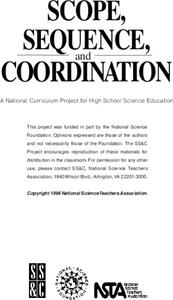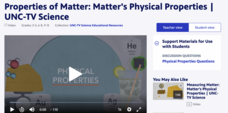Virginia Department of Education
The Particle Theory of Matter
Demonstrate the particle theory of matter to high school scientists with an engaging experiment that allows them to visually see the results as substances change from one state to another. The class concludes with a discussion about how...
Science 4 Inquiry
States and Phases of Matter
Plasma is the most common phase of matter in our universe. Scholars explore the change of energy as molecules change phases of matter. They rotate through stations, graphing the changes in energy level.
Curated OER
Matter and Energy
Does the change in energy of matter lead to a change in mass? Upcoming chemists compare the mass of equal-volume, but different-temperature liquids and materials both before and after a chemical reaction has occurred. In another...
Curated OER
States of Matter Lesson
Second graders identify the three phases of matter and demonstrate how a property can change states of matter. In this states of matter instructional activity, 2nd graders make an Ooze to discover how a solid changes into a liquid....
Center for Learning in Action
Introducing Physical and Chemical Changes
Young scientists investigate chemical and physical changes to the states of matter—gas, liquid, and solid—as well as solutions and suspensions with a variety of demonstrations, grand conversation, and an interactive quiz to check for...
Virginia Department of Education
Thermochemistry: Heat and Chemical Changes
What makes particles attract? Here, learners engage in multiple activities that fully describe colligative properties and allow the ability to critically assess the importance of these properties in daily life. Young chemists conduct...
Columbus City Schools
Changes All Around Us
Whoa! What just happened? That's right, change is everywhere. But what exactly is changing? Middle school science sleuths get to the bottom of the changes matter can experience. Through simple demonstrations, engaging videos, and an...
American Chemical Society
Change in Temperature - Exothermic Reaction
Alone, or as part of the intended unit on chemical reactions, this activity allows learners to experience an exothermic reaction. Here, learners add calcium chloride to a baking soda solution and watch the temperature rise! They will...
Cornell University
Energy Changes in Chemical Reactions
The heat of solution measures how much thermal energy a dissolving substance consumes or gives off. The experiment demonstrates both endothermic and exothermic reactions. Scholars dissolve several substances, measure the temperature...
Center for Learning in Action
Water – Changing States (Part 2)
Here is part two of a two-part instructional activity in which scholars investigate the changing states of water—liquid, solid, and gas—and how energy from heat changes its molecules. With grand conversation, two demonstrations, and one...
It's About Time
Chemistry and Physical Changes
Engage the class like never before as pupils learn to differentiate between multiple physical and chemical changes by conducting a list of small experiments, most often with household materials. They make observations and discuss the...
Virginia Department of Education
Changes in Ecosystems
How does water pollution affect the environment? Provide your class with the resources to answer this question as they learn about eutrophication and ecosystem changes. Over two weeks, they simulate the effects of pollution on the...
Integrated Physics and Chemistry
Law of Conservation of Matter
Does mass change during a chemical reaction? Demonstrate the Law of Conservation of Matter while encouraging class members to be creative with a two-part lesson. First, learners use Alka-Seltzer® tablets and water to demonstrate the...
Consortium for Ocean Science Exploration and Engagement (COSEE)
One Ocean: It Matters!
Here is the first of four poignant lessons on how humans and oceans interact, even if people live far from the coast. This particular lesson also examines studies that are taking place in Antarctica of how climate change is affecting the...
Virginia Department of Education
The Law of Conservation of Matter
The Law of Conservation of Matter can be complex for young scientists to fully grasp. Use this experiment to help simplify the process as pupils perform two experiments to determine mass: one that melts a substance and the other that...
North Carolina State University
Silly Stuff
It's time to get a little silly with this fun primary grade science activity. By simply combining two liquids, white glue and corn starch, a strange solid is formed, commonly known as silly putty. To ensure everything goes smoothly,...
PBS
Properties of Matter: Matter's Physical Properties | UNC-TV Science
Does gold really boil? Learn what temperature gold boils at and more using an animated activity about the properties of matter. Scientists learn about the properties of matter including examples of physical properties, the effect changes...
Curated OER
A New Phase In Town
Middle schoolers explore heat energy and how it is used to change the phase of matter, and discover that temperature does not increase or decrease until the phase change is complete. This extremely well-written plan is packed with great...
Curated OER
Changing Planet: Permafrost Gas Leak
Pair earth scientists up to use an amazing online arctic portal mapping tool and Google Earth to analyze permafrost changes. They compare changes to data on atmospheric concentrations of methane to see if there is a correlation. Then...
Curated OER
Using the Carbon Cycle Interactive Game in the Classroom
An online reading and interactive game bring the path of a carbon molecule to life for your earth science explorers! As an assessment, learners can map out or write about their experience in the carbon cycle. Thoroughly written...
Center for Learning in Action
Investigating Physical and Chemical Changes
Super scientists visit ten stations to predict, observe, and draw conclusions about the physical and chemical changes that occur when different states of matter—liquid, solid, and gas—are placed under a variety of conditions. To...
Discovery Education
Motion in the Ocean
How do temperature changes affect ocean currents? Scholars explore convection currents by demonstrating the flow of water in a baking dish. They use ice, heat, and food coloring to see currents. Then, they draw conclusions about their...
Anglophone School District
Fluids: Force in Fluids
Discuss Archimedes' Principle and fluid forces with your young scientists as they describe the relationship between mass, volume, and density during a series of engaging activities. They use the Participle Theory of Matter to explore the...
PBS
“He Named Me Malala”: Understanding Student Activism Through Film
Malala Yousafzai has become the face of social activism. After watching He Named Me Malala and short student-made films about what young people can do to become instruments of change, class members reflect on what it means to be an...

























